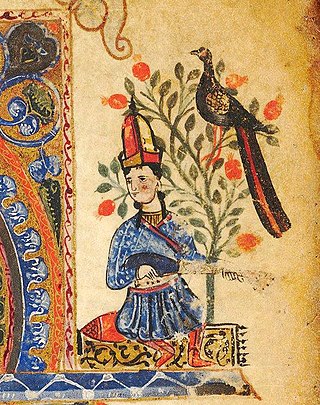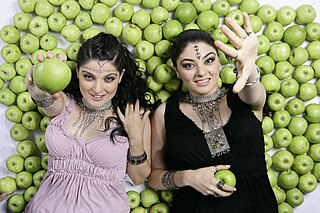Related Research Articles

Charles Aznavour was a French singer, lyricist, actor and diplomat. Aznavour was known for his distinctive vibrato tenor voice: clear and ringing in its upper reaches, with gravelly and profound low notes. In a career as a composer, singer and songwriter, spanning over 70 years, he recorded more than 1,200 songs interpreted in 9 languages. Moreover, he wrote or co-wrote more than 1,000 songs for himself and others. Aznavour is regarded as one of the greatest songwriters of all time and an icon of 20th-century pop culture.
"Mer Hayreniḱ" is the national anthem of Armenia. It was arranged by Barsegh Kanachyan; the lyrics were written by Mikayel Nalbandian. First adopted in 1918 as the anthem of the short-lived First Republic of Armenia, it was subsequently banned after the country was invaded by then incorporated into the Soviet Union. Following the dissolution of the Soviet Union and the restoration of sovereignty in 1991, the song was re-adopted as the national anthem, albeit with slightly modified lyrics.

Armenians are an ethnic group and nation native to the Armenian highlands of West Asia. Armenians constitute the main population of the Republic of Armenia and the de facto independent Republic of Artsakh. There is a wide-ranging diaspora of around five million people of full or partial Armenian ancestry living outside modern Armenia. The largest Armenian populations today exist in Russia, the United States, France, Georgia, Iran, Germany, Ukraine, Lebanon, Brazil, Syria, and Turkey. The present-day Armenian diaspora was formed mainly as a result of the Armenian genocide with the exceptions of Iran, former Soviet states, and parts of the Levant.

The music of Armenia has its origins in the Armenian highlands, dating back to the 3rd millennium BCE, and is a long-standing musical tradition that encompasses diverse secular and religious, or sacred, music. Folk music was notably collected and transcribed by Komitas Vardapet, a prominent composer and musicologist, in the late nineteenth and early twentieth centuries, who is also considered the founder of the modern Armenian national school of music. Armenian music has been presented internationally by numerous artists, such as composers Aram Khachaturian, Alexander Arutiunian, Arno Babajanian, Haig Gudenian, and Karen Kavaleryan as well as by traditional performers such as duduk player Djivan Gasparyan.

Sayat-Nova was an Armenian poet, musician and ashugh, who had compositions in a number of languages.

Soghomon Soghomonian, ordained and commonly known as Komitas, was an Armenian priest, musicologist, composer, arranger, singer, and choirmaster, who is considered the founder of the Armenian national school of music. He is recognized as one of the pioneers of ethnomusicology.

Armenia has participated in the Eurovision Song Contest 15 times since making its debut in 2006, when André became the first participant representing Armenia and was the first singer from the Caucasus region to compete at Eurovision. Armenia has reached the top 10 on seven occasions, with the country's best result in the contest being two fourth-place finishes, achieved by Sirusho with the song "Qélé, Qélé" (2008), and Aram Mp3 with "Not Alone" (2014). 2011 was the first year that Armenia failed to advance from the semi-final round. This was followed by the country withdrawing from the 2012 contest due to security concerns in the host city, Baku. In 2018 and 2019, Armenia consecutively failed to qualify from the semi-finals for the second and third time respectively.

Armenia, officially the Republic of Armenia, is a landlocked country in the Armenian Highlands of West Asia, with geopolitical ties to Europe. It is a part of the Caucasus region and is bordered by Turkey to the west, Georgia to the north and Azerbaijan to the east, and Iran and the Azerbaijani exclave of Nakhchivan to the south. Yerevan is the capital, largest city and financial center.

Armenia has participated in the Junior Eurovision Song Contest since 2007. Armenian Public Television (ARMTV), a member organisation of the European Broadcasting Union (EBU), have been responsible for the selection process of their participants since their debut.

Siranush Harutyunyan, known professionally as Sirusho, is an Armenian singer and songwriter. She received her first award when she was nine years old for her song "Lusabats". Sirusho's first studio album, Sirusho, was released in 2000 followed by the second album Sheram in 2005. In the same year, she was awarded the Future of Armenian Music, Best Album and Best Female Performer awards in the first Armenian National Music Awards.

Armenian art is the unique form of art developed over the last five millennia in which the Armenian people lived on the Armenian Highland. Armenian architecture and miniature painting have dominated Armenian art and have shown consistent development over the centuries. Other forms of Armenian art include sculpture, fresco, mosaic, ceramic, metalwork, engraving, and textiles, especially Armenian carpets.

Inga and Anush Arshakyan or the Arshakyan Sisters are an Armenian folk singing duo. The sisters represented Armenia in the Eurovision Song Contest 2009, eventually finishing in 10th place in the final.

Aram Avetiki Sargsyan, better known by his stage name Aram Mp3, is an Armenian singer and comedian. He represented Armenia in the Eurovision Song Contest 2014 in Copenhagen with the song "Not Alone" and took the 4th place.

"Not Alone" is a song by Armenian singer Aram Mp3. It was internally selected to represent Armenia at the Eurovision Song Contest 2014 in Denmark. The song was revealed on 14 March 2014.

Genealogy was an Armenian supergroup that was formed to represent Armenia in the Eurovision Song Contest 2015. Five of the six members come from a different continent of the Armenian diaspora whose families once spread all over the world after the Armenian genocide of 1915. The five artists from the diaspora also symbolize the five petals of the forget-me-not, while the center of the flower is represented by the sixth artist, based in Armenia.

Depi Evratesil is an Armenian music entertainment show created by the Armenian broadcaster AMPTV. It was used as the Armenian national selection for the Eurovision Song Contest in 2017, 2018 and 2020.

Artsvik Harutyunyan, better known as simply Artsvik, is a Russian-Armenian singer and songwriter. She represented Armenia in the Eurovision Song Contest 2017 with the song "Fly with Me" finishing in 18th place.

Sevak Khanagyan is a Russian-Armenian singer and songwriter. Khanagyan came to prominence while competing in season four of The Voice of Russia in 2015, and he later won season seven of X-Factor Ukraine the following year. He has been a coach on The Voice of Armenia since its fourth season in 2017. Khanagyan represented Armenia in the Eurovision Song Contest 2018 with the song "Qami" (Wind).

Arpine Martoyan, known professionally as Maléna, is an Armenian singer and songwriter. She represented Armenia in the Junior Eurovision Song Contest 2021 with the song "Qami Qami", and went on to win the competition, becoming the second Armenian entrant to win the Junior Eurovision Song Contest.

The Junior Eurovision Song Contest 2022 was the 20th edition of the annual Junior Eurovision Song Contest, organised by the European Broadcasting Union (EBU) and host broadcaster Public Television Company of Armenia (AMPTV). The contest took place on 11 December 2022 at the Karen Demirchyan Sports and Concerts Complex in Yerevan, Armenia, following the country's victory at the 2021 contest with the song "Qami Qami" by Maléna. This was the second time that Armenia hosted the Junior Eurovision Song Contest, the first being in 2011.
References
- Grigor Suni, Armenian music, Yerevan, 2005, p. 102-103, ISBN 99930-60-59-3